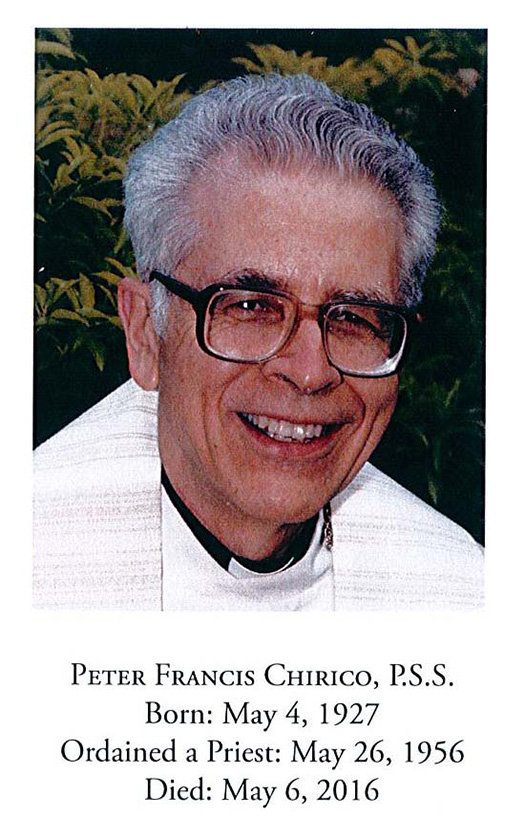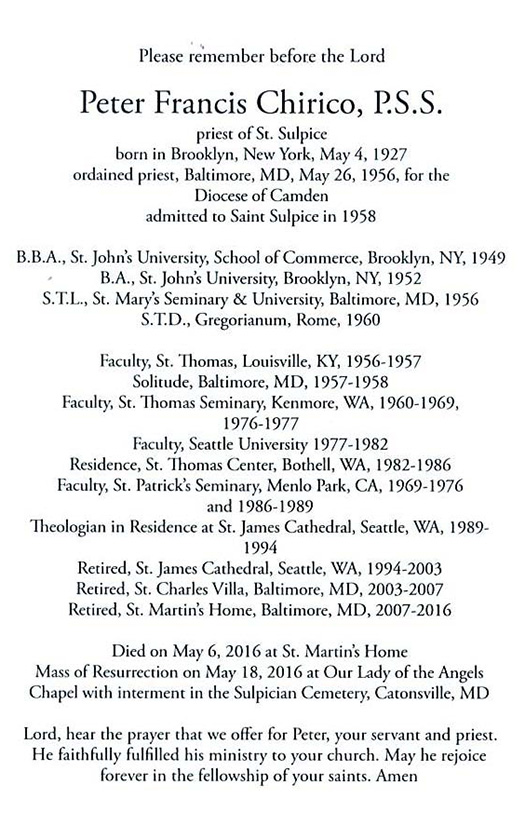Chirico, Father Peter Francis, P.S.S.
2016, May 6
Date of Birth: 1927, May 4
May my teaching drop like the rain, my speech condense like the dew; like gentle rain on grass, like showers on new growth.”
(Deut 32:2)
Whenever Sulpicians remember teachers who have made their mark on us, Fr. Peter Chirico will rise from the dead. A keen mind, a gentle manner, wisdom and humility were God’s blessing to Fr. Chirico. He made them his gift to us in his teaching, his writing, his friendship, and his guidance.
Peter Francis Chirico was born on May 4, 1927 in Brooklyn, NY to Peter and Anna (Marotta) Chirico. He is survived by his two sisters, Anna (Slater) and Eleanor (Sparaco), and two nephews, Peter and Eugene Sparaco.
Fr. Chirico was ordained for the Diocese of Camden, New Jersey in 1956. He earned undergraduate degrees at St. John’s University in Brooklyn, NY (B.B.A., 1949 and B.A., 1952). He did his seminary training at St. Mary’s Seminary & University in Baltimore where he earned an S.T.L. in 1956. He earned the S.T.D. from the Gregorianum in Rome in 1960.
He was admitted to the Society of St. Sulpice in 1958 and served on the faculty of St. Thomas Seminary in Louisville, KY (1956-1957). Then, after doctoral studies, he was sent to the West Coast where he spent the rest of his active ministry as a Sulpician. He served on the faculty of St. Thomas Seminary in Kenmore, WA (1960 – 1969) and then at St. Patrick’s Seminary in Menlo Park, CA (1970-1975). While at St. Patrick’s, he earned the respect of Archbishop McGucken with whom he had many spirited theological discussions. He returned to St. Thomas Seminary in 1976. After that seminary closed in 1977, Fr. Chirico remained in Seattle with residence at St. Thomas Center teaching and consulting for Seattle University’s Corpus Ministerial Training Program. He served on the faculty of Seattle University until 1982 and remained in residence at St. Thomas Center until 1986. He then rejoined the faculty of St. Patrick’s Seminary in Menlo Park, CA (1986 – 1989). In 1989 Fr. Chirico returned to Seattle to lecture in the parishes and to serve as theologian for the Archdiocese with residence at St. James Cathedral.
Fr. Chirico loved the Northwest and he was much loved by a supportive network of lay, clerical and religious friends, who kept in touch with him until he died. He held the hands of many in his heart. He was especially fond of Archbishop Raymond Hunthausen for whom he served as theologian, consultant and friend, and of Fr. Michael G. Ryan, pastor of St. James Cathedral where Fr. Chirico lived. After he retired in 1994, he remained in residence at St. James Cathedral until 2003.
Throughout his ministry, Fr. Chirico held women’s gifts in high regard. Among his many friends in the Northwest, Sr. Cecilia Ranger, SNJM, Sr. Katherine Dyckman, SNJM, and Ms. Kathy Riley, for example, were his frequent dialogue partners with whom he tested many of his ideas for homilies, workshops, and articles. In Baltimore, Dr. Barbara De Lateur, knowing that Fr. Chirico loved to talk on the phone, would help him use her cell phone to stay in touch with his friends in the Northwest when he could no longer manage to use a phone on his own. She knew that the one luxury he allowed himself was the cost of long-distance calls, and so she granted him that joy as he grew weaker from Parkinson’s disease.
Fr. Chirico lived with Parkinson’s disease for over twenty-five years. When it was no longer safe for him to live on his own, he moved to the Sulpician retirement community of St. Charles Villa in Baltimore, MD in 2003. Leaving Seattle at that time was very hard for him and for his close friends. He was a beloved priest there and no one wanted to see him go. As he grew more and more in need of nursing care in 2007, Fr. Chirico was transferred to the nursing facility of St. Martin’s Home in Baltimore, MD. He remained there until his death in 2016.
As a seminary professor and theologian, Fr. Chirico is well remembered for the breadth of his knowledge and the depth of his insight. He had a firm grasp of the Christian tradition and the ability to focus the wisdom of the ages onto the immediate concerns of contemporary life. He himself was constantly learning how to confront the old with the new and the new with the old. Though trained prior to Vatican II, Fr. Chirico knew that theology had to be in dialogue with new trends in philosophy and with the social sciences. He had great respect for Karl Rahner and Bernard Lonergan and his own work, especially his monumental book, Infallibility: The Crossroads of Doctrine (1977), reflected their influence.
Fr. Chirico was clearly a Vatican II theologian. The growth of lay ministry in the Northwest, for example, is tied to his creative vision and genius. In consultation with two other Sulpicians, Frs. Mel Farrell, P.S.S. and Phil Keane, P.S.S., and together with representatives of the Archdiocese of Seattle and Seattle University, the Corpus Ministerial Training Program was developed to train lay ministers with the same level of quality and standards as clerical candidates. The collaboration that lay and clerical ministers take for granted today can be traced to this pioneering work of Fr. Chirico and his colleagues who looked upon ministry as an uninterrupted dialogue of collaboration. Fr. Chirico was also involved in the ecumenical movement after the Council and was a very well-respected member of the Church Council of Greater Seattle.
Students of Fr. Chirico often ribbed him, always in good humor, for his animation and enthusiasm as a lecturer and conversationalist. He would get totally absorbed in his topic. Listening to him talk theology was like trying to get a drink from a fire hydrant. With his hands waving and eyes sparkling, he would pour forth a stream of ideas, one building on the other. Such an image of Fr. Chirico as a teacher and theologian is far removed from those of somber monks and their even more somber theological treatises. His mind was always moving with ideas, and he would probe with surgical precision to the heart of a problem. Only one who lives with wisdom as he did could be so inclusive of others and open to their ideas. He loved his students and he loved to teach. Conversation is the best teacher and Fr. Chirico loved to converse. His former students still recall with fondness how he inspired them to think and how their own thoughts took wing when he lectured or engaged them in conversation.
Though theology was his first love, baseball was not far behind. As his friend Kathy Riley put it, “When we would walk around Green Lake and he’d be getting tired, all I’d have to do is bring up something about baseball and he’d forget how tired he was and begin quoting me statistics!” His steel-trap mind held baseball statistics as firmly as it did his knowledge of the Catholic tradition. Though no one was ever surprised at how he could recall a Scripture quote, make a patristic reference, or give his opinion on the latest article in Theological Studies, we were all surprised when he began to give batting averages, RBIs and ERAs of players past and present.
Brilliant though he was and always alive with ideas, Fr. Chirico was also a very gentle man with a discerning heart and keen insight into the human condition. His manner of relating to others stemmed from his deep respect for persons. He epitomized the notion that what a teacher is, is more important than what the teacher teaches. For one year at St. Patrick’s Seminary (1987-1988), Fr. Chirico served as interim rector while the appointed rector, Fr. Howard Bleichner, P.S.S., took a sabbatical. Fr. Chirico did not like the office details of administration, so he passed those on to the academic dean, Fr. Ronald Witherup, P.S.S. He kept for himself, however, all the official duties and personnel responsibilities of dealing with bishops, faculty and students. That one year was rather turbulent. Although Fr. Chirico ushered more seminarians to the door than in any other recent school year, they all seemed to appreciate the way he told them the bad news. He was able to convey a sense of personal worth and appreciation at the very time that he was helping them see that priesthood was not their vocation.
Fr. Chirico died peacefully on May 6th, two days after his 89th birthday, in St. Martin’s Home under the care of the Little Sisters of the Poor. The Mass of the Resurrection was celebrated on May 18th at Our Lady of the Angels Chapel at The Charlestown Retirement Community. The Provincial, Fr. John Kemper, P.S.S., was the main celebrant and Fr. Michael G. Ryan, pastor of St. James Cathedral in Seattle, WA and longtime friend of Fr. Chirico, gave the homily. Interment followed in the Sulpician Cemetery in Catonsville, MD.
Fr. Chirico was priest, scholar, teacher, and warm friend—all spiced with wisdom and wit. We look back with much appreciation for such a brilliant teacher and scholar and with even more gratitude for such a warm friend. Through Christ, this man of God has returned to God. It should be an intriguing return for sure, especially with two other Sulpicians, Fr. Raymond Brown, P.S.S. and Fr. Eugene Walsh, P.S.S., waiting to welcome him. For their sheer knowledge and love, the trialogue among them will be unique indeed.
Richard M. Gula, P.S.S.
Director of Personnel


